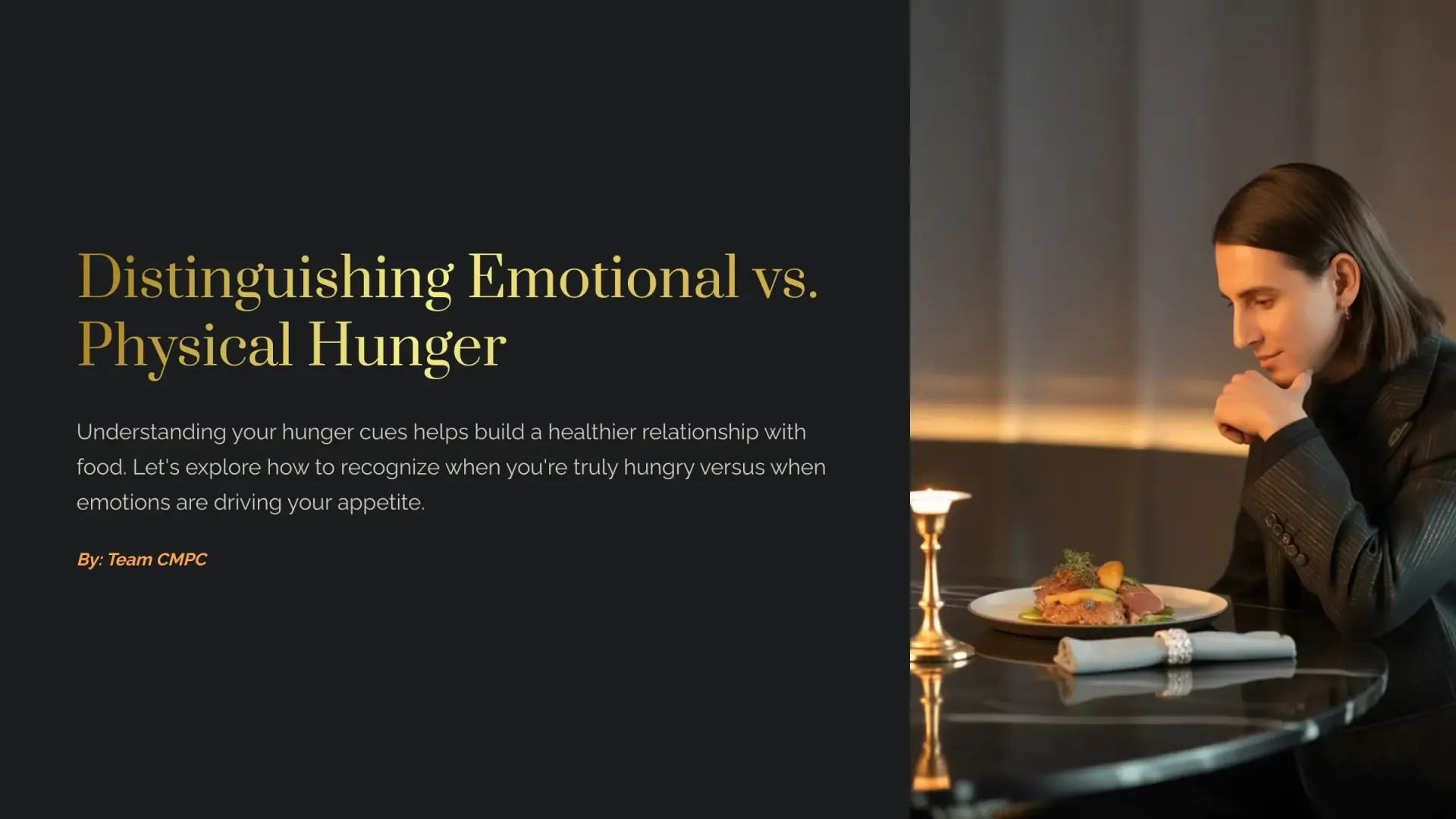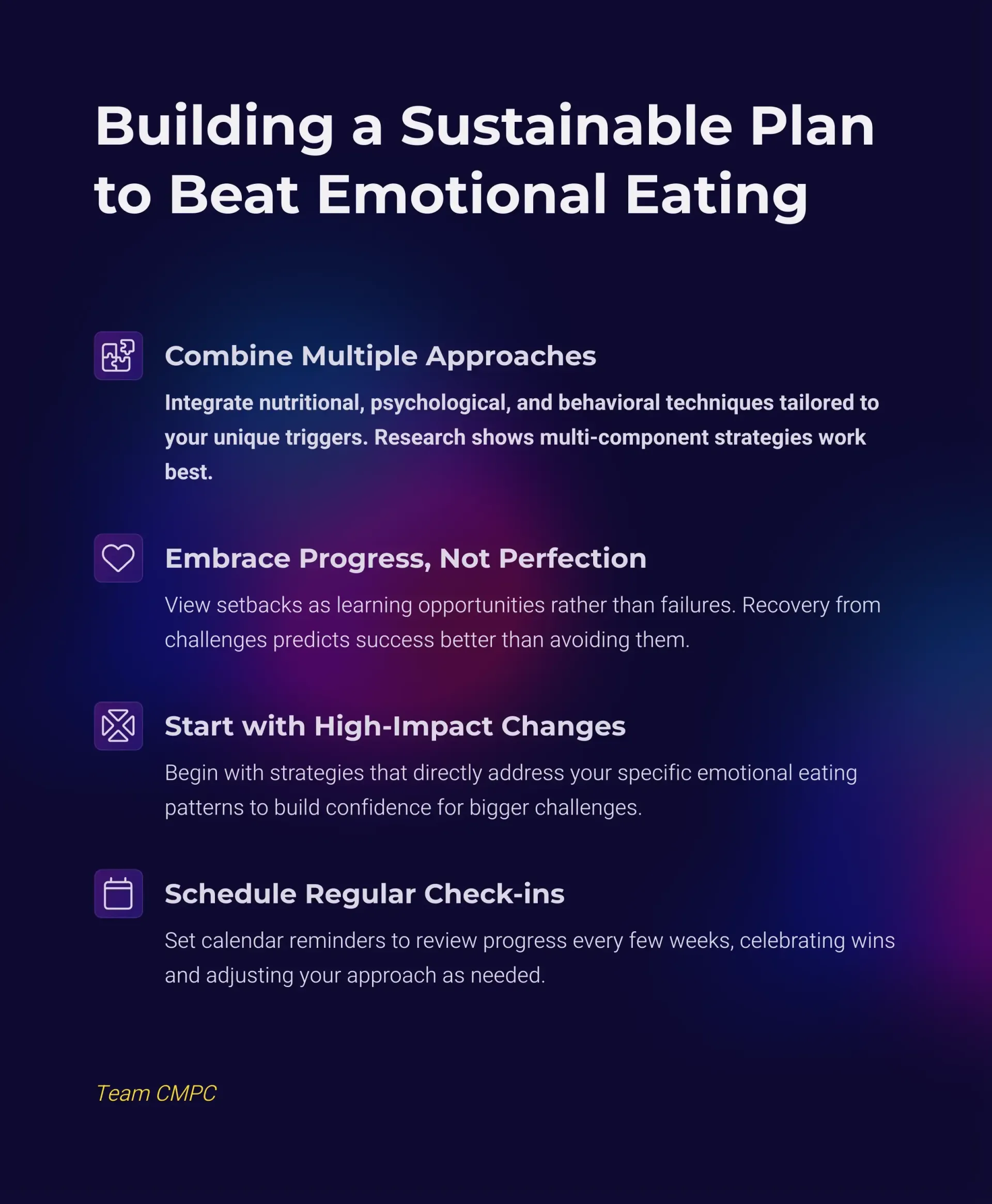
When life gets overwhelming, many of us turn to food for comfort. That chocolate bar after a difficult meeting, those crisps while watching telly during a stressful evening, or that extra serving of pasta when feeling down. These emotional eating moments are everyday experiences affecting countless individuals across Ottawa, Canada.
At CMPC, we understand that emotional eating isn't simply about lacking willpower. It's a complex response to stress, anxiety, sadness, and even happiness that can significantly impact your weight management journey.
Emotional eating occurs when we use food to soothe emotional distress rather than to satisfy physical hunger. This behaviour can create a challenging cycle that interferes with weight loss goals and overall health.
The good news?
With proper understanding and strategic approaches, you can develop healthier coping mechanisms to manage stress and regain control over your eating habits.
Learn About the Connection Between Emotions and Eating
The relationship between our emotions and eating patterns runs deeper than we often realize. Our brains are wired to seek pleasure and avoid pain, and food, particularly those high in sugar, fat, and salt, can trigger the release of dopamine, the "feel-good" hormone. This creates a temporary sense of relief or happiness during stressful situations.
The Science Behind Emotional Eating:
Stress hormones and appetite stimulation
When stressed, our bodies release cortisol, increasing appetite and cravings for high-calorie foods. Cortisol stimulates the reward centres in our brain, making us seek comfort in food that gives immediate pleasure. Studies show that elevated cortisol levels increase hunger and specifically direct us toward energy-dense foods that may temporarily alleviate stress.
Learned behaviour patterns
Many emotional eating habits develop over years of associating food with comfort. Perhaps your family celebrated achievements with special meals, or you were treated when upset as a child. These associations create neural pathways that can be difficult to redirect. These emotional connections to food often begin in childhood and strengthen throughout life, creating powerful psychological bonds between specific foods and emotional states.
Mindless eating during emotional states
When emotionally overwhelmed, we tend to eat without awareness, consuming more calories than our bodies need. This disconnection between physical hunger and eating can contribute significantly to weight gain. Research indicates that people who eat while distracted or emotionally stressed consume 20-50% more calories than they would otherwise.
Biological comfort mechanisms
Certain foods can alter brain chemistry temporarily, relieving negative emotions. Carbohydrates, for instance, can increase serotonin levels, creating a calming effect. These biological responses create powerful reinforcement for emotional eating patterns. The temporary mood elevation from these foods creates a self-reinforcing cycle that becomes increasingly difficult to break without intervention.
Common Emotional Triggers for Overeating
Understanding your personal triggers is the first step toward managing emotional eating. Common triggers include:
Stress from work or family responsibilities
Deadlines, difficult colleagues, challenging family dynamics, or overwhelming schedules can drive stress eating. The pressure to perform professionally while maintaining family harmony creates a perfect storm for emotional eating episodes. High-pressure careers in government and tech sectors often contribute to stress-related eating patterns.
Boredom or emptiness
Eating becomes an activity to fill time or distract from feelings of emptiness. Without engaging activities or meaningful connections, food often becomes the default entertainment. This pattern frequently emerges during transitional life periods or when experiencing social isolation, which has become increasingly common in our digital age.
Social anxiety or discomfort
Many people eat more in social situations to manage anxiety or pain. Food becomes a way to occupy yourself when feeling awkward or uncomfortable. Social gatherings, where food is abundant, and eating is expected, can trigger excessive consumption as a coping mechanism for social discomfort.
Loneliness or isolation
Food can become a substitute for human connection, offering comfort when feeling alone. The ritual of preparing and eating food can temporarily fill the void left by limited social interaction. This pattern has become particularly prevalent in urban centres where busy lifestyles sometimes limit meaningful social connection opportunities.
Celebration or reward
Not all emotional eating stems from negative emotions. We often use food to celebrate accomplishments or reward ourselves after hard work. While occasional celebratory indulgences are regular, they can become problematic when they're the primary way we acknowledge achievements.
Recognizing Emotional Hunger Versus Physical Hunger
Learning to distinguish between emotional and physical hunger is crucial for breaking the cycle of emotional eating. While they may feel similar, there are essential differences to recognize:
Signs of Emotional Hunger
Sudden onset
Emotional hunger often comes on quickly and feels urgent. It develops rapidly and demands immediate satisfaction, unlike the gradual build of physical hunger. One moment, you're fine; the next, you feel an overwhelming urge to eat something specific.
Specific cravings
Emotional hunger typically involves cravings for particular comfort foods, usually high in sugar, salt, or fat. You're not open to various options but fixated on specific "comfort foods." These cravings often target processed foods designed to hit the "bliss point" of maximum palatability.
Mindless eating
You may eat without paying attention, sometimes finishing an entire package without realizing it. This autopilot eating bypasses our natural satiety signals. You might even have trouble recalling everything you've eaten afterward.
Eating despite fullness
Emotional eating often continues even after feeling physically full because it's attempting to fill an emotional need, not a physical one. The drive to continue eating overrides physical discomfort signals. This disconnect between physical fullness and continued eating is a hallmark of emotion-driven consumption.
Accompanied by guilt
Emotional eating frequently leads to feelings of guilt, shame, or regret afterward. These negative emotions can trigger more emotional eating, creating a complex cycle to break. The shame spiral that follows emotional eating episodes can be particularly destructive to self-esteem and weight management efforts.
Signs of Physical Hunger
Gradual development
Physical hunger builds gradually over hours as your body needs refuelling. It doesn't appear suddenly or with intense urgency. You can track its progression from initial hunger signals to stronger sensations.
Open to various foods
When physically hungry, you're willing to eat different foods, not just comfort foods. Even healthier options sound appealing when your body truly needs nourishment. This openness to diverse food options reliably indicates genuine physical hunger.
Stops when full
Physical hunger is satisfied when your stomach is full, and you can easily stop eating when that happens. Your body sends clear signals that its needs have been met. These natural satiety signals help regulate appropriate portion sizes.
No negative emotions
Eating to satisfy physical hunger doesn't produce feelings of guilt or shame. It's simply meeting a biological need, like drinking water when thirsty. Satisfaction rather than regret follows eating when physically hungry.
Accompanied by physical signals
Stomach growling, energy reduction, slight headache, or difficulty concentrating are physical signals of true hunger. Your body has clear ways of communicating its need for nourishment. These physical manifestations are reliable indicators that your body, not your emotions, drives your hunger.

Effective Strategies to Manage Emotional Eating
Breaking the cycle of emotional eating requires a multi-faceted approach. Here are practical strategies you can implement:
Develop Emotional Awareness
Food and mood journaling
Keep a daily log of what you eat, when you eat, how hungry you are (on a scale of 1-10), and what emotions you are experiencing. This practice helps identify patterns between feelings and eating behaviours. Over time, your journal will reveal clear correlations between specific emotional states and eating patterns. Many of our patients find that just two weeks of consistent journaling provides remarkable insights into their eating triggers.
Pause before eating
When you feel the urge to eat, pause for five minutes. Ask yourself if you're physically hungry or responding to emotions. This brief reflection period can significantly reduce impulsive, emotional eating. During this pause, identify the specific emotion you're experiencing and its source. This simple habit creates a vital space between trigger and response.
Body scanning
Practice regularly checking in with your body's physical sensations. Learn to recognize the difference between stomach and mouth hunger (craving taste rather than needing food). Physical hunger typically manifests below the neck, while emotional hunger focuses on mouth and taste sensations.
Identify your personal triggers
Through awareness practices, list your specific emotional eating triggers. Once identified, you can develop targeted strategies for each trigger. Having personalized countermeasures for your specific triggers dramatically increases your chances of success.
Develop Healthier Coping Mechanisms
Physical activity alternatives
Exercise releases endorphins that naturally improve mood and reduce stress. Even a short 10-minute walk can reduce cravings and improve emotional state. Physical activity doesn't need to be intense to be effective for emotional regulation. Gentle movement practices like walking through beautiful parks can be particularly effective for stress reduction.
Stress reduction techniques
Learn and practice stress management methods like deep breathing, progressive muscle relaxation, meditation, or yoga. These techniques activate the parasympathetic nervous system, reducing stress hormones. Incorporating 5-10 minutes of these daily practices builds resilience against stress-induced eating.
Creative expression
Engage in activities like drawing, writing, music, or crafts that provide emotional release without food. Creative activities offer an alternative way to process complex emotions. Many creative pursuits also promote flow states, which research shows significantly reduces stress and emotional reactivity.
Connect with others
Reach out to supportive friends or family when feeling emotional rather than turning to food. Social connection releases oxytocin, which naturally reduces stress. Building a support network for your weight management journey can provide accountability and emotional reinforcement when challenges arise.
Develop a "stress toolkit"
Create a list of 5-10 quick activities you can turn to instead of emotional eating. Keep this list visible in places where you typically experience cravings. Having predetermined alternatives prevents decision fatigue when you're already emotionally stressed. Your toolkit might include listening to a favourite song, stepping outside for fresh air, or doing a quick stretch routine.
Create Environment Changes
Kitchen reorganization
Structure your kitchen to make healthy choices easier and trigger foods to be less accessible. Store trigger foods out of sight, or don't keep them at home. Environmental cues strongly influence our eating decisions, often without conscious awareness. The simple act of requiring more effort to access trigger foods can significantly reduce impulsive consumption.
Practice portion control
If you indulge in comfort foods, pre-portion them rather than eating from the package. This creates a natural stopping point and increases awareness. Using smaller plates and bowls has been scientifically proven to reduce consumption while maintaining meal satisfaction.
Create eating rituals
Designate specific places and times for eating, and avoid eating while watching television, working, or scrolling through your phone. Distracted eating increases consumption and decreases satisfaction. Establishing consistent eating routines helps regulate both appetite and emotional associations with food.
Healthy food preparation
Prepare healthy snacks in advance to prepare when hunger or cravings strike. Convenience is a significant factor in food choices, especially when emotionally vulnerable. Having nutritious, satisfying options readily available makes healthy choices more likely during emotional moments.
Mindful Eating Practices
Mindful eating involves paying full attention to the experience of eating and drinking. It can transform your relationship with food and help break automatic eating patterns:
Core Mindful Eating Techniques
- Engage all senses: Before eating, observe the colours, smells, textures, and presentation of your food. Take time to appreciate these aspects before taking your first bite. This sensory engagement slows the eating process and enhances satisfaction with smaller portions.
- Eat slowly and chew thoroughly: Take small bites and chew completely before taking another bite. This improves digestion and allows you to notice fullness cues earlier. Aim for 20-30 chews per bite to fully experience the food and give your body time to register satisfaction.
- Remove distractions: Turn off screens and put away books or work while eating. Focus entirely on your meal and the act of nourishing your body. Creating this dedicated eating time elevates meals from mindless consumption to meaningful nourishment.
- Check in with hunger levels: Periodically pause during your meal to assess your hunger level. Stop eating when you feel comfortably satisfied rather than complete. The Japanese concept of "hara hachi bu" suggests stopping at 80% fullness, which research shows supports weight management and longevity.
- Practice gratitude: Before eating, take a moment to express gratitude for your food and everyone involved in bringing it to your table. This brief practice shifts your focus from stress to appreciation. Gratitude practices have been shown to reduce cortisol levels, which directly impacts stress-related eating.
Nutritional Strategies to Support Emotional Regulation
What we eat significantly affects our mood and emotional resilience. Strategic nutrition choices can help stabilize mood and reduce emotional eating triggers:
Mood-Stabilizing Nutrition Approaches
Balance blood sugar
Eat regular meals containing protein, healthy fats, and complex carbohydrates to prevent blood sugar fluctuations that can trigger cravings and mood swings. Stable blood glucose levels create stable emotional states.
Increase omega-3 fatty acids
Fats found in fatty fish, walnuts, and flaxseeds are essential for supporting brain health and have been linked to improved mood regulation. Omega-3s are precursors to anti-inflammatory compounds that help regulate neurotransmitter function.
Boost serotonin naturally
Foods rich in tryptophan (like turkey, eggs, and cheese) combined with healthy carbohydrates can boost serotonin, our natural mood stabilizer. The carbohydrates help transport tryptophan across the blood-brain barrier.
Support gut health
A healthy gut microbiome is increasingly linked to better mood regulation. Include fermented foods, fibre-rich vegetables, and probiotic foods in your diet. The gut-brain connection is a frontier of emotional health research, with growing evidence that gut bacteria directly influence neurotransmitter production.
Stay hydrated
Mild dehydration can mimic hunger and negatively affect mood. Aim to drink 2-3 litres of water daily, adjusting for activity level and weather conditions. A good practice is to drink a full glass of water when cravings first hit, as thirst is often misinterpreted as hunger.
Professional Support Options for Emotional Eating
Sometimes, self-help strategies aren't enough, particularly when emotional eating is deeply entrenched or connected to more complex emotional issues. Professional support can provide crucial guidance:
Types of Professional Support Available
Cognitive-behavioural therapy (CBT)
This evidence-based approach helps identify thought patterns that drive emotional eating and develops healthier responses to emotional triggers. CBT has the strongest research support for addressing emotional eating patterns.
Mindfulness-based interventions
Programs like Mindfulness-Based Eating Awareness Training (MB-EAT) combine mindfulness practices with specific techniques for emotional eating challenges. These approaches build awareness of internal hunger and fullness cues while developing non-judgmental awareness of emotional states.
Nutritional counselling
Working with a registered dietitian specializing in emotional eating can provide personalized nutrition strategies while addressing psychological aspects of eating. Modern nutritional counselling integrates psychological approaches with nutrition science for comprehensive support.
Support groups
In-person and online groups provide community, accountability, and shared wisdom from others experiencing similar challenges. The social support component of these groups addresses the isolation that often accompanies emotional eating struggles.
Medical weight management programs
Comprehensive programs like those offered at CMPC combine multiple approaches, including medical supervision, nutritional guidance, psychological support, and sometimes medication when appropriate. These multidisciplinary approaches address the complex nature of emotional eating and weight management.
When to Seek Professional Help
Consider reaching out to professionals if:
Emotional eating significantly impacts your quality of life or health
When emotional eating regularly interferes with your daily activities, relationships, or medical conditions, professional support is warranted.
Self-help strategies haven't been effective
Professional guidance can offer new perspectives and tailored strategy if you've consistently tried various approaches without success.
Emotional eating is connected to diagnosed or suspected mental health conditions
Conditions like depression, anxiety disorders, or trauma histories often require specialized approaches that address both the eating behaviour and underlying conditions.
You experience regular feelings of being out of control with food
Recurring episodes of feeling unable to stop eating may indicate more complex issues that benefit from professional assessment.
Weight fluctuations affect your physical health
When emotional eating contributes to weight changes that impact conditions like diabetes, heart disease, or mobility, medical supervision becomes increasingly essential.

Building a Sustainable Plan for Long-Term Success
Managing emotional eating isn't about perfect adherence to rules but developing a flexible, compassionate approach that works over time:
Creating Your Personalized Strategy
Combine multiple approaches
The most successful strategies integrate nutritional, psychological, and behavioural techniques tailored to your unique triggers and preferences. Multi-component approaches consistently show better outcomes in research.
Focus on progress, not perfection
Expect setbacks as standard parts of the change process rather than signs of failure. Each challenge provides valuable information for refining your approach. The ability to recover from setbacks is more predictive of long-term success than avoiding them entirely.
Start with highest-impact changes
Identify the strategies likely to affect your specific emotional eating patterns and begin there immediately. Success with initial changes builds confidence for tackling more challenging aspects.
Create environmental supports
Enlist friends, family, or colleagues to support your efforts, and modify your home and work environments to reduce triggers. Our environment often has more influence on our behaviours than willpower alone.
Schedule regular reassessment
Set calendar reminders to review your progress every few weeks, celebrating successes and adjusting strategies as needed. These review periods prevent slight drift from becoming a complete abandonment of healthy habits.
Your Path Forward with CMPC
We understand that managing emotional eating is essential to successful weight management. Our comprehensive approach addresses the physical, psychological, and environmental factors that influence eating behaviours in our Ottawa practice:
How We Can Help
Personalized assessment
Our medical professionals evaluate your specific emotional eating patterns within the context of your overall health and weight management goals. This thorough assessment ensures that recommendations address your unique needs.
Multidisciplinary team
Access to physicians, dietitians, and mental health professionals provides comprehensive support addressing all aspects of emotional eating. This team approach ensures that no aspect of your emotional eating challenges is overlooked.
Medical interventions when appropriate
For some individuals, medical approaches like the Allurion Gastric Balloon System work alongside behavioural strategies to reduce vulnerability to emotional eating. These interventions can create a window of opportunity for establishing new habits with less interference from hunger and cravings.
Ongoing support
Regular follow-up appointments and access to resources help maintain motivation and address challenges as they arise. Long-term support significantly improves outcomes compared to short-term interventions alone.
Community connection
Optional group programs connect you with others on similar journeys, reducing isolation and providing shared wisdom. The power of community support complements professional guidance, creating a more robust foundation for lasting change.
Taking the First Step
Managing emotional eating is a journey that begins with awareness and compassion. By understanding the connections between your emotions and eating patterns, developing alternative coping strategies, and creating supportive environments, you can break free from emotional eating cycles and develop a healthier relationship with food.
Remember that seeking support isn't a sign of weakness but a decisive step toward lasting change. At CMPC, our team in Ottawa is ready to provide the professional guidance, tools, and encouragement you need on this journey.
Would you like to explore how our compassionate weight management approaches might support your needs?
We invite you to call our clinic today to schedule a consultation with one of our caring professionals. Together, we can develop a personalized plan that addresses emotional eating while supporting your overall health and well-being on your weight loss journey.
Interested in learning more about the emotional aspects of weight management?
Read our article "Why Do I Feel Guilty or Anxious About My Weight?" to explore how these emotions can impact your weight loss journey.
Ready to take control of emotional eating and begin your transformation?
Call our Ottawa clinic NOW to schedule your FREE consultation with our compassionate team of weight management specialists. We're here to support you every step of the way.










